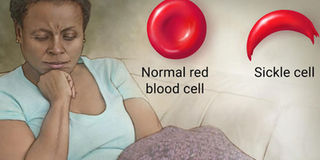Government wants mandatory sickle cell tests before marriage

A group of disorders that cause red blood cells to become misshapen and break down
What you need to know:
This followed results from a research conducted by Makerere University College of Health Sciences where at least 12,283 (13 per cent) out of 90,000 sampled people tested to have sickle cell trait, which causes sickle cell anemia. Another 664 had the disease.
KAMPALA- The government has said they will push to have mandatory sickle cell testing before marriage to reduce the disease’s high prevalence reported in a recent study.
State minister for primary Healthcare Sarah Opendi made the remarks at the launch of the sickle cell testing campaign under the theme break the silence.
This followed results from a research conducted by Makerere University College of Health Sciences where at least 12,283 (13 per cent) out of 90,000 sampled people tested to have sickle cell trait, which causes sickle cell anemia. Another 664 had the disease.
She explained that the ministry lacked statistics for planning purposes but added the data will be used to focus on the most affected regions.
“Sickle cell disease wasn’t a disease government prioritised. We can’t plan and ask for resources without sufficient data or information on the disease burden. These results have now armed us with the right information to develop a national sickle cell control strategy. Our strategy should be to reduce the incidence of sickle cell disease. This can only be achieved through screening and counseling people before marriage to reduce the trait in intermarriages,” Ms Opendi said last week.
Dubbed Uganda Sickle Surveillance, the report shows that 14 districts have 47 per cent of the disease burden. The research was supported by Cincinnati Children Hospital. Sickle cell anemia is a disorder that makes the body turn normal circle shaped red blood cells into an oval shape. The abnormal oval-shaped red blood cells block the blood flow causing enormous pain to sufferers.
For one to have the disease, both parents have to be carriers of the sickle cell trait. The lead researcher, Dr Grace Ndeezi, reported that a higher prevalence rate was found in two regions of east central and mid-north Uganda while south western region recorded the lowest prevalence.
According to Dr Ndeezi, the disease concentration in some regions is as a result of genetic and ethnicity reasons. However, there is hope that once people are sensitised to test before marriage, it would reduce its spread as individuals who will be found to have the trait will be discouraged from marrying each other.
The scientists said a couple with the trait has high chances of giving birth to a sickler but are adevised to find another partner who is not a carrier. The government has already setup centres in Lira and Mbale districts other than Mulago where people can go to test. They plan to expand the services to the rest of the country.
Mr Charles Kiyaga, the national sickle cell coordinator at the ministry of health, said: “The results show that out of every seven people, at least one has the sickle cell trait and out of every 150 people, at least one has the disease. This is a high number.”




